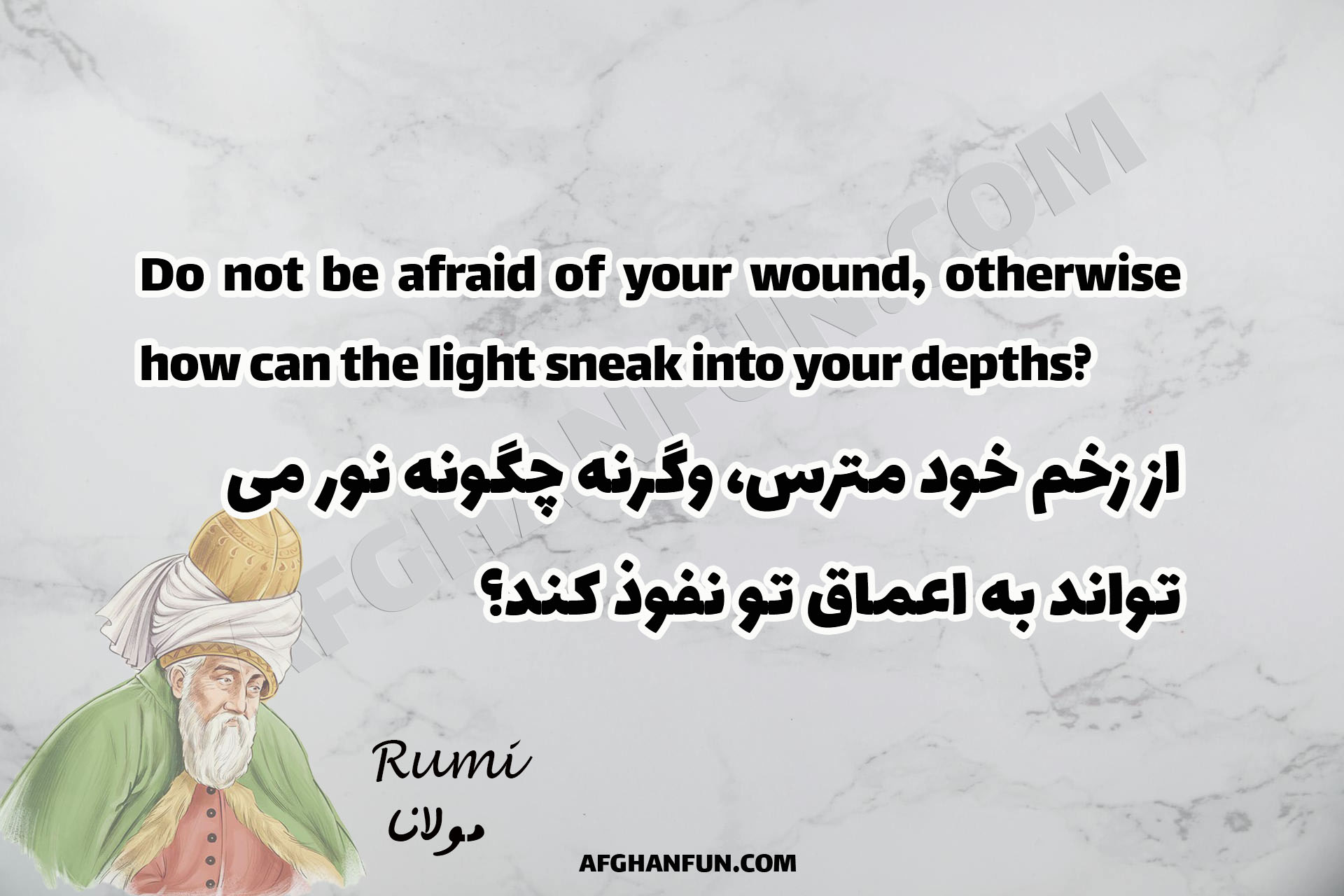Do not be afraid of your wound, otherwise how can the light sneak into your depths?
Rumi
Аз захми худ матарс, вагарна чӣ гуна нур метавонад ба аъмоқи ту ворид шавад?
МАВЛОНО ҶАЛОЛУДДИН МУҲАММАДИ БАЛХӢ
Ин сухани зебои Мавлоно ба муҳимияти рӯ ба рӯ шудан бо захмҳои даруни ва тарсҳои мо ишора мекунад. Ӯ мегӯяд, ки тарсидан аз захмҳо монеъ аз расидани нури ҳақиқат ва огаҳӣ ба дохили мо мешавад. Барои рушд ва таҳаввули маънавӣ, бояд ба ҷои пинҳон кардани захмҳо, ба онҳо рӯ ба рӯ шавем ва иҷозат диҳем, ки нури илоҳӣ ба аъмоқи вуҷуди мо ворид шавад.
از زخم خود مترس، وگرنه چگونه نور میتواند به اعماق تو نفوذ کند؟
مولانا
این بیت زیبا از مولانا، به اهمیت روبرو شدن با زخمهای درونی و ترسهایمان اشاره میکند. او میگوید که ترسیدن از زخمها مانع از رسیدن نور حقیقت و آگاهی به درون ما میشود. برای رشد و تحول معنوی، باید به جای پنهان کردن زخمها، به آنها روبرو شویم و اجازه دهیم نور الهی به اعماق وجودمان نفوذ کند.
لا تخف من جرحك، وإلا كيف يمكن للنور أن يتسلل إلى أعماقك؟
مولانا جلال الدین محمد الرومي
تفسير: تشير هذه الآية الجميلة من مولانا إلى أهمية مواجهة الجروح الداخلية ومخاوفنا. فهو يقول إن الخوف من الجروح يمنع نور الحقيقة والمعرفة من الوصول إلى داخلنا. من أجل النمو والتطور الروحي، يجب علينا مواجهة جروحنا بدلاً من إخفائها والسماح للنور الإلهي بالتغلغل في أعماق وجودنا.
This profound quote by Rumi carries layers of meaning, touching on themes of vulnerability, transformation, and spiritual growth. Let’s break it down into its key elements and explore what each part might convey:
1. “Do not be afraid of your wound”
Rumi begins by addressing the human tendency to avoid or resist pain, suffering, or emotional wounds. These “wounds” could refer to both literal pain and symbolic suffering—emotional scars, personal failures, or deep-seated traumas. In many spiritual and psychological traditions, pain is often seen as something to avoid or numb. Rumi, however, suggests a different perspective: instead of fearing or fleeing from our wounds, we should embrace them.
The word “wound” itself is evocative. It implies vulnerability, rawness, and imperfection—qualities that many people might shy away from. However, Rumi implies that these wounds are not inherently negative; rather, they are opportunities for deeper healing and transformation.
2. “Otherwise how can the light sneak into your depths?”
The second half of the quote introduces the metaphor of “light,” which is often used in mystical and spiritual contexts to represent wisdom, grace, divine presence, or inner peace. The idea is that our wounds—while they may feel painful or destructive—have the potential to be gateways to spiritual awakening.
The phrase “sneak into your depths” is particularly powerful. It suggests that light, or transformative energy, is subtle. It doesn’t force its way in; it enters through the cracks and openings we make when we allow ourselves to be vulnerable and open up to our pain. The “depths” here refer to the deepest parts of the self—the unconscious mind, the soul, or the emotional core of a person. By allowing our wounds to be seen, acknowledged, and healed, we create space for this light to enter.
3. Spiritual and Psychological Layers
At a deeper level, Rumi is pointing to the process of personal or spiritual growth. Many spiritual teachings emphasize the idea that suffering, while painful, is often the path to greater wisdom and enlightenment. Just as a seed must break open to sprout, the heart and soul sometimes need to experience rupture and vulnerability before they can expand and receive greater illumination.
In psychological terms, this could be likened to the idea of integrating painful experiences—facing one’s shadow self or confronting repressed emotions. By doing so, we can bring unconscious material into conscious awareness, which ultimately leads to healing and wholeness.
The “light” might also be seen as a metaphor for the higher self, divine love, or the awareness that emerges when we stop hiding from our wounds. As we confront and accept our vulnerabilities, we invite a more profound and enlightened presence into our lives.
4. The Role of Surrender
Rumi’s words also speak to the importance of surrendering to the process of life—of accepting that suffering and pain are not to be avoided but understood and integrated. This idea echoes the notion of “radical acceptance” in therapeutic practices, where one embraces all aspects of themselves, even those parts that feel broken or incomplete.
There is a delicate balance here. The wound, while painful, is not something to fix or cover up; it is an opening. Rumi’s wisdom suggests that we must not turn away from our wounds, but rather allow them to teach us. In doing so, we allow space for something much greater—spiritual illumination, deeper self-awareness, and healing—to enter our being.
5. Paradox of Healing
Rumi often uses paradox to convey deeper truths. This quote is no exception. It suggests that light (symbolizing healing, growth, and insight) cannot enter without the presence of a wound (symbolizing vulnerability, rawness, and suffering). The paradox is that the wound itself creates the space for the healing light to enter, showing that suffering and joy, pain and enlightenment, are not opposites but complementary forces in the dance of life.
Conclusion: The Invitation to Transformation
Ultimately, Rumi is inviting us to reconsider our relationship with pain and suffering. Instead of seeing them as signs of weakness or failure, he invites us to view them as gateways to deeper wisdom and spiritual growth. The wound, in this context, is not something to hide from but something to embrace, as it creates the opening through which light can enter and transform us.
This quote encourages us to be present with our pain, to not be afraid of it, and to trust that even in our most difficult moments, there is potential for deep healing and illumination. It’s a reminder that growth often comes through struggle, and by accepting our wounds, we open ourselves to a greater depth of love, awareness, and understanding.











